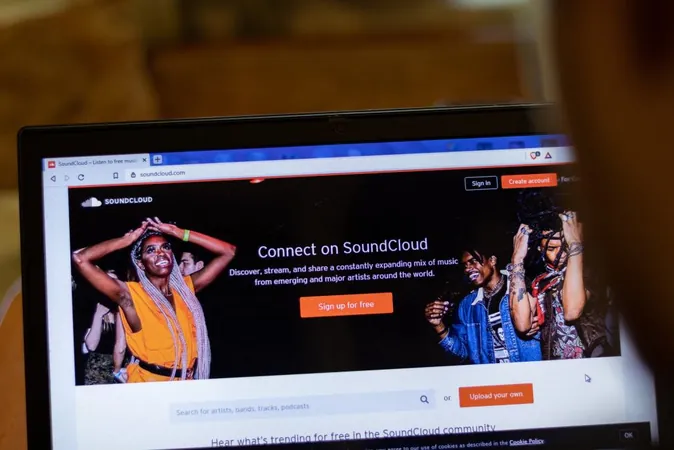
SoundCloud's Controversial AI Update: What You Need to Know
2025-05-11
Author: Daniel
SoundCloud's Terms of Service Revamp Raises Eyebrows
In a notable move, SoundCloud has revamped its terms of use to include rules about using user-uploaded content for AI training. Announced in February 2024, the update has sparked a whirlwind of concern among artists, although the company hastened to clarify that no artist content has been utilized for AI training as of yet.
Safeguards in Place, but Are They Enough?
Marni Greenberg, SoundCloud's Senior Vice President and head of communications, reached out to The Verge with reassurances that third-party AI initiatives involving SoundCloud content are outright banned. She's emphasized new technical safeguards, including a 'no AI' tag aimed at blocking unauthorized usage. Currently, SoundCloud employs AI for enhancing user experiences through personalized recommendations and fraud detection, with plans for further integration on the horizon.
A Quiet Announcement Sparks User Backlash
The way these terms were communicated has fueled discontent among users. Many feel the company's promise of 'prominent notice' fell short, as direct alerts like emails were not sent.
The Industry's Ethical Dilemma with AI
SoundCloud’s update isn't an isolated incident; it's part of a broader trend across the music industry, where platforms grapple with ethical AI usage. Over 400 music organizations have taken a stand by publishing formal AI ethics statements, addressing concerns over data training, copyright, and fair compensation for creators.
Major music labels, including Warner Music Group and Sony Music, have explicitly prohibited unauthorized AI training on their material, setting strong industry standards. Recently, more than 200 artists voiced their concerns in an open letter, calling for boundaries around the use of their content in AI training.
Confusion Across Streaming Platforms
While SoundCloud moves to clarify its policies, other platforms like Spotify and YouTube are piecing together their own rules. Spotify permits some AI-generated music but bans tracks that impersonate established artists, creating blurry lines for what constitutes inspiration versus imitation. On the other hand, YouTube has rolled out regulations for synthetic content but struggles with distinguishing between human and AI-generated work.
AI Tools: A Double-Edged Sword for Creators
The mixed reception of SoundCloud’s updated terms reflects a deeper tension in the industry: the balance between AI's creative promise and the potential threat to artist livelihoods. Tools like LANDR are gaining traction, producing over 330,000 songs monthly and attracting substantial investment. Yet, studies show that many listeners would rethink a song's value upon discovering it’s AI-generated, particularly when it comes to vocal performance.
As the market sentiment around AI music technologies grows, so too do questions about their implications for real human musicianship. This dilemma is especially poignant for platforms like SoundCloud, which have built their reputation on supporting artists while also exploring the boundless potential of AI.
SoundCloud's Balancing Act Continues
As it stands, SoundCloud is at a crossroads, navigating the intricate web of user concerns, ethical considerations, and technological advancements. The company must tread carefully to ensure it remains a haven for artists while seizing the opportunities that AI presents.



 Brasil (PT)
Brasil (PT)
 Canada (EN)
Canada (EN)
 Chile (ES)
Chile (ES)
 Česko (CS)
Česko (CS)
 대한민국 (KO)
대한민국 (KO)
 España (ES)
España (ES)
 France (FR)
France (FR)
 Hong Kong (EN)
Hong Kong (EN)
 Italia (IT)
Italia (IT)
 日本 (JA)
日本 (JA)
 Magyarország (HU)
Magyarország (HU)
 Norge (NO)
Norge (NO)
 Polska (PL)
Polska (PL)
 Schweiz (DE)
Schweiz (DE)
 Singapore (EN)
Singapore (EN)
 Sverige (SV)
Sverige (SV)
 Suomi (FI)
Suomi (FI)
 Türkiye (TR)
Türkiye (TR)
 الإمارات العربية المتحدة (AR)
الإمارات العربية المتحدة (AR)